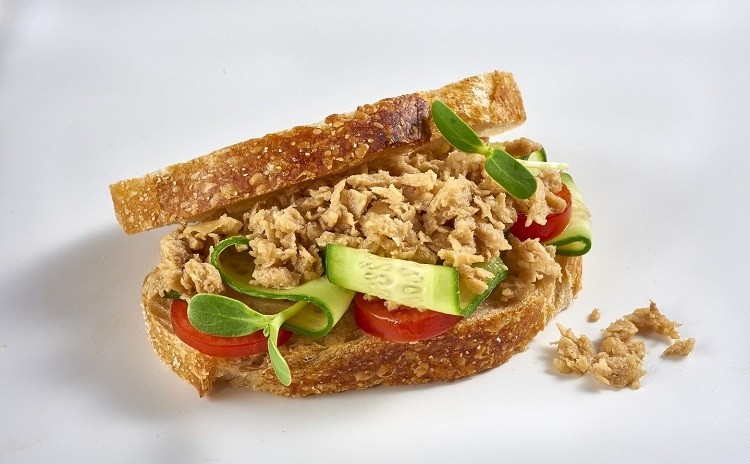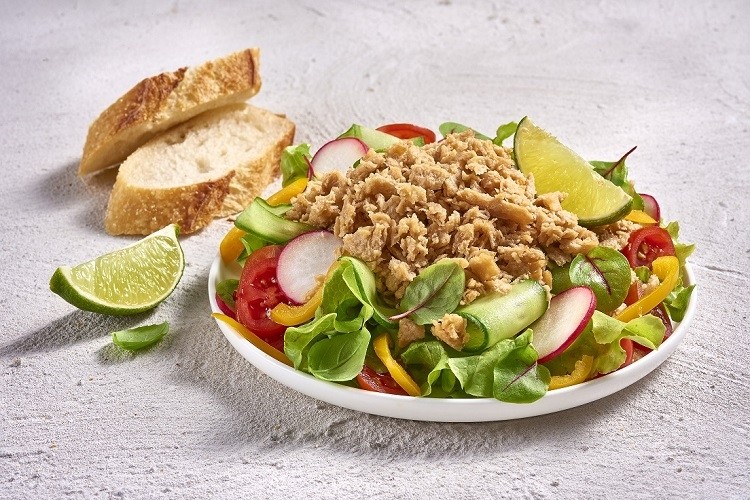Tuna is amongst the most well-liked, if not probably the most consumed, fish on the earth. In accordance with Fortune Enterprise Insights, the worldwide tuna fish market is predicted to develop from $41.06bn (€38.21bn) in 2022 to $49.70bn in 2029.
Main patrons of canned tuna, thought-about an reasonably priced and handy supply of protein, embrace Europe and Asia, with rising markets in South America and the Center East.
Nevertheless, not all tuna fishing is environmentally sustainable. “Aquaculture and the overfishing of this high-in-demand fish has had a devastating impact on their numbers to the purpose that it has put a number of species, such because the yellowfin and the Atlantic Bluefin, on the sting of extinction,” in accordance with Tom Rothman, head of worldwide gross sales at Israeli plant-based start-up Vgarden.
“This not solely poses issues by way of meals safety but in addition negatively impacts the fragile and fragile steadiness of the marine atmosphere.”
After 12 months of R&D, the start-up has developed a plant-based different to canned tuna it believes will assist ‘flip the tide’ on unsustainable fishing practices and contribute to the restoration of the ocean’s wild tuna populations.
Reaching the feel and odor of tinned tuna
The beginning-up’s purpose was to recreate the style, texture, and odor of tinned tuna with vegetation. This was the R&D groups best problem, Omer Eliav, chief of R&D and Vgarden co-founder defined.
“The most important problem in creating an similar tinned tuna is to supply the entire sensory expertise of style, texture, and odor. We need to make it engaging to all shoppers, not simply vegans,” he informed FoodNavigator.
After ‘loads’ of trials and tastings, the start-up managed to realize the ‘precise feel and appear’ of tuna. “It was additionally necessary to wash up the label from any undesirable components and ensure it housed only a quick record of components,” he added.
One other ‘main’ problem in creating plant-based tuna, in accordance with the R&D lead, lies in making it scalable, in order that the product could possibly be marketed at a aggressive worth. “We examined a whole lot of components and processes to create the product, however a few of them had been too costly or couldn’t be scaled for mass manufacturing.”
Vgarden settled on pea protein as its main supply of plant-based protein. Along with the corporate’s ‘distinctive course of’ and selection of components, the pea protein helped the start-up obtain the specified texture, Eliav defined.
“We use extruded vegetable proteins. These undergo our proprietary course of which supplies them the correct style and texture to imitate the unique canned tuna. Not too long ago, we filed a patent for the revolutionary components and course of.”
Flavour and dietary profile
The beginning-up claims to have achieved a ‘distinctive marine style’ in its plant-based tuna, just like its standard counterpart. Not like different plant-based seafood options, this was not achieved with algae – no less than, not but.
“The distinctive marine style is achieved on account of a mix of pure flavourings and the distinctive manufacturing technique that efficiently infuses it into the plant components,” we had been informed.
The corporate is at present exploring the potential for infusing algae oil extract, nonetheless, and preliminary exams and returning ‘promising outcomes’. “We’re undoubtedly planning to take this analysis additional,” revealed Eliav.
Vgarden’s tuna analogue accommodates a complete protein content material of between 11.2-14% (earlier than and after filtration). Typical tuna is even greater in protein: a can of tuna offers an estimated 42g of full protein.
Different components in Vgarden’s different embrace fibres and sunflower oil. One other well being profit, famous the corporate, is that being sourced outdoors of the marine ecosystem means its fish-free tuna accommodates no poisonous metals, microplastics, and different ocean pollution.
“One among our first improvement targets was to create a extremely nutritious and sustainable product,” defined Eliav. “As canned tuna is known for its excessive protein content material, this was our start line.”
The result’s a ‘good tuna-eating expertise’, we had been informed. “It’s excessive in protein and accommodates solely seven pure components. We at the moment are engaged on fortifying our novel tuna with Omega-3 fatty acids. Our vegan tuna flakes are canned in sunflower oil as is usually utilized in conventional canned tuna.”
Personal-label growth
Vgarden is promoting its tuna-free product private-label. It’s already being rolled out into retail and foodservice sectors and is obtainable in two packaging codecs: pouches for chilled storage and tins to present the ‘full genuine tuna expertise’.
To facilitate non-chilled storage, the R&D group developed a plant-based tuna that may be canned and sterilised at excessive temperatures, but nonetheless retain its flavour and texture, famous the corporate.
The plant-based tuna is designed to be built-in into any conventional tuna-based recipe, equivalent to tuna mayo sandwiches, salads, pastas, sushi, and pizza. “Many meals retailers are turning to our tuna analogue to create a traditional tuna niçoise salad or a tuna pasta that can give its discerning flexitarian shoppers the complete expertise of the true factor,” famous the start-up’s CEO Ilan Adut.
The corporate is at present promoting its product ‘throughout’ Israel, in addition to in a number of chosen nations in Europe, Australia, and North America, and count on to launch it within the japanese Asia later this 12 months.




